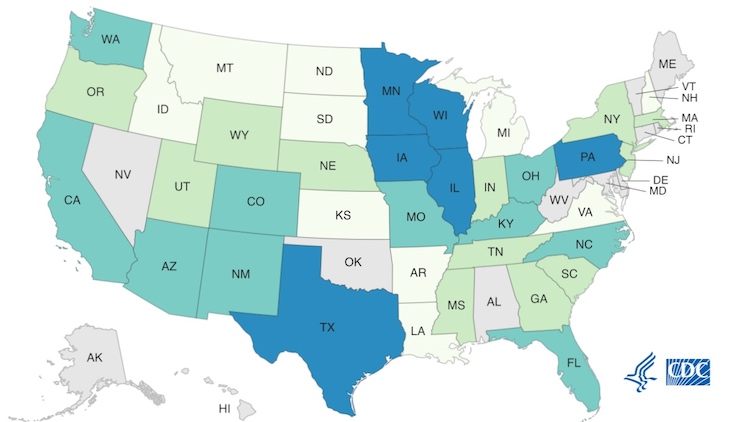The newest backyard poultry Salmonella outbreak has sickened at least 219 people in 38 states, has hospitalized 27, and one person has died, according to the Centers for Disease Control and Prevention (CDC). One of these outbreaks usually occurs every year in the United States. Backyard poultry, which includes chicken and ducks, can carry Salmonella bacteria even if they look healthy and clean. And those pathogens can spread anywhere in the areas where the poultry live and roam.

People get sick by touching anything where the birds live or the birds themselves, and then touching their mouths or food. Children are especially susceptible to this type of infection transmission because they so often put their fingers in their mouths.
The case count by state is: Arizona (7), Arkansas (1), California (8), Colorado (7), Florida (7), Georgia (6), Idaho (3), Illinois (11), Indiana (4), Iowa (10), Kansas (1), Kentucky (7), Louisiana (3), Massachusetts (4), Michigan (1), Minnesota (15), Mississippi (4), Missouri (8), Montana (2), Nebraska (4), New Hampshire (1), New Jersey (4), New Mexico (7), New Y0rk (4), North Carolina (7), North Dakota (2), Ohio (9), Oregon (6), Pennsylvania (12), South Carolina (4), South Dakota (1), Tennessee (6), Texas (11), Utah (4), Virginia (2), Washington (9), Wisconsin (13), and Wyoming (4). Illness onset dates range from February 15, 2022 to May 19, 2022. The patient age range is from less than 1 to 89 years. Of 95 people who gave information to investigators, 27, or 28%, have been hospitalized. The person who died lived in Tennessee.
The actual number of ill persons in this outbreak is likely much higher than this total, because most people who contract this infection do not see a doctor and are not tested and reported to the government. The multiplier used for these outbreaks is 38.3, which means that there could be more than 8,300 sick from contact with backyard poultry.
In interviews, patients were asked about their behaviors and what they ate the week before they got sick. Of the 87 people interviewed, 61, or 70%, said they had contact with backyard poultry. Of 56 people who gave information about their diets, 16 said they ate eggs from backyard poultry and two said they ate meat from backyard poultry.
Whole genome sequencing conducted on isolates from patients showed that they were closely related genetically. That means that people in this outbreak likely got sick from the same type of animal.
The CDC has specific advice for anyone who decides to keep backyard poultry. Always wash your hands with soap and water immediately after touching backyard poultry, their eggs, or anything in the area where they live and roam. Never kiss or snuggle birds and don’t eat or drink around them. Supervise children when around these birds and make sure they wash their hands properly afterward. Children under the age of five should not touch ducks, chicks, ducklings, or other backyard poultry. Keep the equipment you use to care for the birds outside of your house.
In addition, collect eggs often, throw away cracked eggs, and refrigerate eggs to slow the growth of pathogens. Always cook eggs and dishes made with eggs until 160°F to kill bacteria.
Symptoms of a Salmonella infection include a fever, chills, headache, nausea, stomach cramps, vomiting, abdominal cramps and pain, and diarrhea that may be bloody. If you have backyard poultry and have been sick, see your doctor. You may be part of this backyard poultry Salmonella outbreak.




